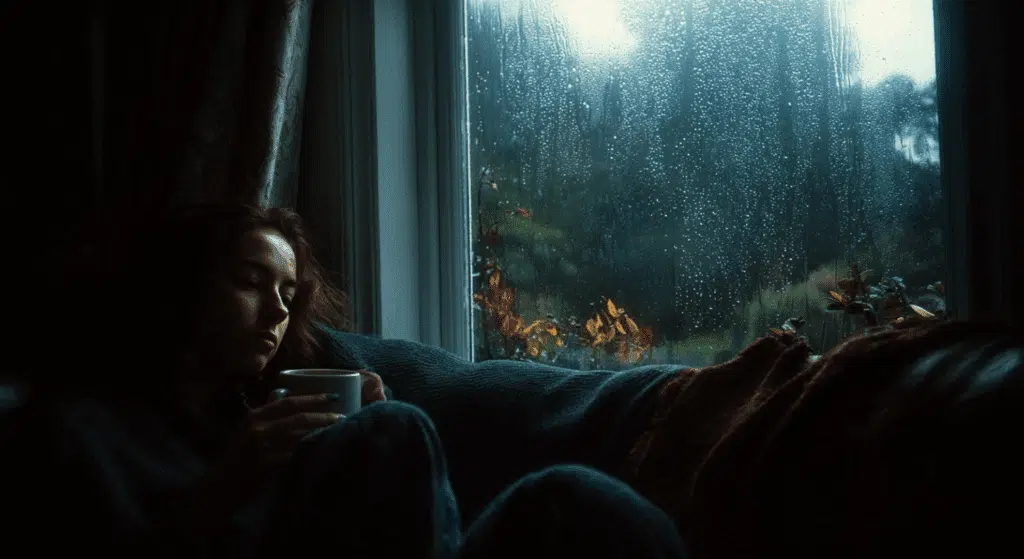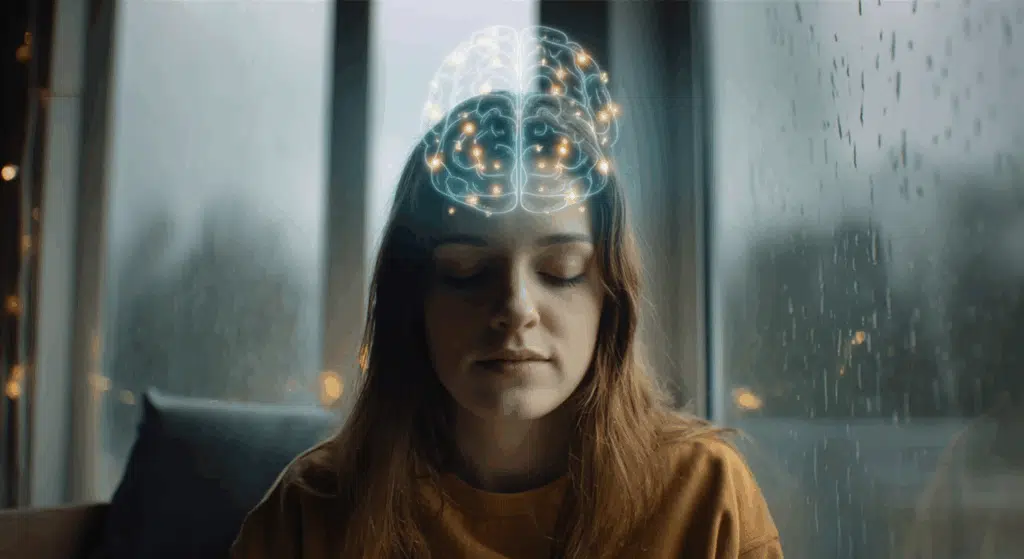Rain always makes me slow down. The sky dims, the air feels thick, and before I know it, I’m yawning, even after a full night’s sleep. I started to ask myself, why does rain make you sleepy? I wanted to understand what’s really going on inside my body when the weather changes like that.
In this blog, you’ll learn how rainy weather affects your brain and body. We’ll look at how melatonin, serotonin, and dopamine shift during storms, how the sound of rain triggers calm, and why low light and humid air add to that sleepy feeling.
You’ll also find tips to stay alert and learn when rain-related fatigue is normal and when it might be something more.
Does Rain Make You Sleepy?
Yes, rain can make you feel sleepy and it’s actually pretty common. When it rains, the sky gets darker, which tells your body to make more melatonin, the hormone that helps you sleep. The sound of rain also acts like soft background noise, which helps your brain relax.
On top of that, rainy days often mean less activity, more time indoors, and cooler temperatures, all of which signal your body to slow down. Some people feel cozy and calm, while others feel drained and low on energy.
So if you find yourself yawning or wanting a nap when it rains, you’re not alone. It’s just your body responding to the calm and quiet around you.
General Population on Rainy Day Fatigue
Many people online say they get sleepy or cozy when it rains and you’re not alone.
On a Reddit conversation, someone asked: “Why does sleeping when it’s raining feel so good?” and many replied they drift off faster during storms.
On Quora (and similar platforms), users share stories like-
“I always feel like napping when the rain starts” or “Rain makes me feel calm and peaceful.”
Yet not everyone reacts the same. Some feel peaceful, a gentle calm takes over. Others feel lethargic, struggling to stay motivated or awake.
One person might curl up with a book, another might feel their body just doesn’t want to move. These shared feelings show how rain affects many—but in slightly different ways.
Why Does Rain Make You Sleepy?

Rain doesn’t just change the weather outside, it also changes what’s happening inside your brain. The dim light, cooler air, and steady sounds affect your body’s natural chemicals.
These changes can make you feel tired, slow, or even a little down. Let’s know it down in a simple way:
Melatonin: The Sleep Hormone That Increases in Low Light
Your body has a small part in the brain called the pineal gland. This gland makes melatonin, the hormone that helps you sleep. Normally, melatonin levels go up at night, telling your body it’s time to rest.
But when it rains, the dark clouds make the sky look like it’s evening—even during the day. This confuses your brain. It thinks night is coming, so it starts making more melatonin too early. That’s why you start yawning and feel like taking a nap even if it’s the middle of the day.
Serotonin and Mood
Serotonin is a chemical in your brain that helps you feel happy and alert. It also helps you stay focused and balanced.
Your brain makes more serotonin when you get sunlight. That’s why bright, sunny days can lift your mood and give you energy. But on rainy days, sunlight is low or even blocked. That means your serotonin level can drop. With less serotonin, you may feel gloomy, sleepy, or less motivated.
Even if nothing is wrong, you might feel off on cloudy days and this is a big reason why.
Dopamine and Motivation
Dopamine is another brain chemical that helps with motivation. It gives you that “push” to get things done and feel excited.
Rainy days are quiet and calm, with less activity going on. Your brain gets less input from the outside world; less light, less sound, and fewer things happening. Because of this, your brain makes less dopamine. When dopamine is low, you may feel slow, bored, or lazy.
That’s why it’s harder to start tasks or feel excited about anything when the weather is gray and rainy.
Circadian Rhythm Confusion
Your body has an internal clock called the circadian rhythm. It helps control when you sleep and when you wake up. This clock relies on sunlight to stay on schedule.
When it’s sunny in the morning, your body knows it’s time to wake up and get moving. But on rainy days, it’s dark even after the sun is up.
This tricks your brain into thinking it’s still early morning or even nighttime. Your circadian rhythm gets confused. That’s why rainy mornings feel slow and groggy, and why you might not feel fully awake until much later in the day.
In short, rainy weather doesn’t just make the streets wet, it makes your brain behave differently too. Less sunlight means more melatonin, less serotonin, and less dopamine.
Your body gets the signal to rest, not to act. And that’s why your brain feels foggy and tired when the rain starts falling.
What Happens to the Air When It Rains

Rain doesn’t just change the mood, it changes the air around you too. These small changes can affect how your body feels and reacts, especially when it comes to sleepiness and low energy. Let’s break down the three big ways rain changes the air:
Lower Barometric Pressure
Before or during a storm, the barometric pressure drops. This means the air becomes lighter, and the oxygen in the air is spread out more.
Even though it’s a small change, your body can feel it. With less pressure, your blood vessels may expand just a little, and your brain might get slightly less oxygen. This can make you feel tired, dizzy, or sluggish. Many people feel this way before a storm hits — almost like their body knows something’s coming.
Increased Humidity
Rain brings humidity, which means there’s more water in the air. Humid air feels thicker and can be harder to breathe, especially for people with asthma or allergies.
This damp air also makes it harder for your body to cool itself down. You may feel sticky, warm, and drained. That extra warmth can make your body work harder, which leads to fatigue. That’s another reason you may feel tired or slow on a rainy day.
Negative Ions and the Calm Effect
There’s a theory that rain, especially with thunder or lightning, creates negative ions. These are tiny particles that are found in nature, especially after rain, near waterfalls, or at the beach.
Some scientists believe that negative ions may help the brain relax, lower stress, and improve mood. Even though the evidence isn’t strong, some people say they feel refreshed and peaceful after a storm.
So while the science is still being studied, many do report a calm, clear-headed feeling when the air is fresh after rain. Whether it’s the ions or just the cooler air and clean smell, the effect is real for a lot of people.
Together, these air changes: lower pressure, high humidity, and possibly negative ions, all play a role in why rainy days feel different. They don’t just affect the sky. They affect you.
Why Rain Feels So Calm: Sound, Behavior, and the Brain

Rain doesn’t just change the weather; it changes how we think, feel, and act. The sound, the mood, and even what we do differently on rainy days all affect the brain in quiet but powerful ways.
Rain is a type of pink noise; soft, steady, and soothing. Unlike white noise, which can be sharp and high-pitched, pink noise is deeper and more balanced. Think of it like the difference between TV static and a soft rainfall.
This type of sound helps your brain produce alpha waves. These waves show up when you’re calm, like during light meditation or just before sleep. That’s why the sound of rain makes your brain feel more relaxed and your body ready to rest. Your brain also ties rain sounds to peaceful memories.
This connection between sound and emotion is called associative calm. Over time, your brain links the rhythm of rain with comfort. So even hearing it can make you feel like it’s time to relax, even if nothing else around you changes.
Rainy days change our behavior. You’re more likely to stay inside, sit more, and move less. You skip outdoor plans or rush through chores. This lower activity level means you’re using less energy. When your body slows down, your brain does too.
With less movement and less outside noise, your brain switches into a rest mode, helping you feel drowsy even if you’ve had enough sleep.
Cultural and Emotional Associations
Rain is also tied to how we’ve been raised or what we’ve seen in movies and books. It’s often shown as a time to pause, reflect, or stay cozy. We learn that rainy days are for slowing down.
Because of that, rain can shift your emotions. You may feel calm, quiet, or sleepy, not because of the rain itself, but because of how you’ve learned to respond to it.
In short, it’s not just one thing. It’s the sound of the rain, your past experiences, your slower pace, and the emotions that all come with it. Together, they shape how your brain reacts, and why rainy days feel like the perfect time to rest.
Is Rain-Triggered Fatigue a Bad Thing?
Feeling tired when it rains is totally normal for most people. The mix of low light, soft sounds, and less activity naturally tells your body to slow down. It’s just your system reacting to a calmer environment.
In most cases, this kind of tiredness is harmless. It usually fades once the weather clears and the sun comes back. It’s okay — even healthy — to rest more on slow, quiet days.
But if you feel exhausted all the time, even on sunny days, it might be more than just the weather. Constant fatigue could be a sign of depression, chronic fatigue syndrome, or a sleep disorder.
If you’re always low on energy, having trouble getting out of bed, or feeling down for weeks at a time, it’s a good idea to talk to a doctor or mental health provider. Don’t ignore it; your body could be asking for help.
Easy Tips to Stay Energized on Rainy Days
Rainy days can make it hard to stay focused and awake, but a few small changes can help. Try these easy tips to boost your energy and mood when the weather feels heavy:
- Use a light therapy lamp or bright lighting: Bright, white light can help wake up your brain and reduce melatonin levels.
- Start your morning with movement: A few minutes of stretching or light indoor exercise gets your blood flowing and boosts energy.
- Drink plenty of water: Even if it’s damp outside, dehydration can sneak up and make you feel more tired.
- Let in fresh air: Open a window or use a fan to improve airflow and give your brain a little oxygen boost.
- Play upbeat music: A fun, lively playlist can help shake off that slow, sleepy mood.
- Use citrus or mint scents: Scents like lemon or peppermint can perk up your senses and help you focus.
- Make a warm drink part of your routine: A cozy cup of tea or coffee can be a calming energy boost, especially if you make it a special moment.
These small habits can help your body and mind feel more alert, even when the sky is gray.
Conclusion
Now I understand why does rain make you sleepy. It’s not just a lazy mood; my brain, body, and even the air respond in real ways when the weather shifts. Next time it rains, I’ll probably still yawn, but now I’ll know exactly why. It’s kind of comforting to have that answer.
Now it’s your turn. Think about how your body reacts when the sky turns gray. Use what you’ve learned here to notice the signs, stay sharp when needed, or simply let yourself rest without guilt. Rain isn’t always a slowdown; sometimes it’s a reset.
If you found this helpful, keep reading. Check out the rest of the blogs to better understand how your environment shapes your energy, mood, and focus!









